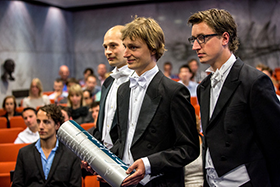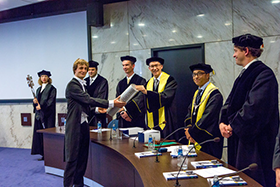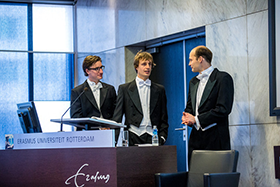PhD Defence: Maintenance Centred Service Parts Inventory Control
Maintenance Centred Service Parts Inventory Control
 How well is inventory control aligned with maintenance in your organisation? How can you use inventory control to meet maintenance targets? These are two questions that Willem van Jaarsveld discusses in his PhD dissertation entitled <link doctoral-programme phd-in-management phd-projects detail>Maintenance Centered Service Parts Inventory Control. The dissertation develops methods to remove the knowledge barrier prohibiting companies from effectively basing service part inventory control on maintenance needs.
How well is inventory control aligned with maintenance in your organisation? How can you use inventory control to meet maintenance targets? These are two questions that Willem van Jaarsveld discusses in his PhD dissertation entitled <link doctoral-programme phd-in-management phd-projects detail>Maintenance Centered Service Parts Inventory Control. The dissertation develops methods to remove the knowledge barrier prohibiting companies from effectively basing service part inventory control on maintenance needs.
Different service parts can often be used together when performing maintenance on capital goods such as aircraft, trains, etc. By aligning their service parts inventory control based on this knowledge, companies would be able to base their inventory decisions directly on planned maintenance, making it easier to achieve maintenance targets on time.
Maintenance information is often ignored in controlling service parts inventories because of a lacking understanding of how to properly align inventory control with maintenance. In his thesis, Willem van Jaarsveld develops methods to remove this barrier, guiding organisations in basing inventory control directly on maintenance.
Van Jaarsveld finds that service parts demand forecasts can be significantly improved when based on maintenance planning, and he develops methods that allow companies to guarantee that all service parts needed to complete maintenance are available.
Willem van Jaarsveld’s dissertation was defended on 30 May. His supervisor was <link people rommert-dekker>Professor Rommert Dekker of Erasmus University Rotterdam. Other members of the Doctoral Committee were <link people erwin-van-der-laan>Dr. Erwin van der Laan, also of the Erasmus University of Rotterdam, Professor Ruud Teunter of the University of Groningen and Professor Geert-Jan van Houtum of Eindhoven University of Technology.
About Willem van Jaarsveld
 Willem van Jaarsveld holds master's degrees in Physics from Utrecht University and Econometrics and Management Science from Erasmus University Rotterdam (cum laude). In 2008, he started his PhD candidacy at Erasmus School of Economics. His field of research is Operations Research, and in particular service logistics. He has developed methods that allow companies to translate their business objectives to inventory policies for individual service parts. He has applied his research in several projects with companies such as Fokker Services and Shell Global Solutions.
Willem van Jaarsveld holds master's degrees in Physics from Utrecht University and Econometrics and Management Science from Erasmus University Rotterdam (cum laude). In 2008, he started his PhD candidacy at Erasmus School of Economics. His field of research is Operations Research, and in particular service logistics. He has developed methods that allow companies to translate their business objectives to inventory policies for individual service parts. He has applied his research in several projects with companies such as Fokker Services and Shell Global Solutions.
Chapters of this thesis have been presented at various conferences, such as CORS-INFORMS, ISIR, ESREL, POMS, and the INFORMS Annual Meeting, and published in the International Journal of Production Economics, Reliability Engineering and System Safety, and the European Journal of Operational Research. Other chapters have been submitted to international, refereed journals.
After defending his PhD thesis, Willem will work as an assistant professor at the Econometric Institute of the Erasmus University Rotterdam. He will continue to perform research in the area of service logistics, and to apply his research in practice.
Abstract of Maintenance Centred Service Parts Inventory Control
High-tech capital goods enable the production of many services and articles that have become a part of our daily lives. Examples include the refineries that produce the gasoline we put in our cars, the photolithography systems that enable the production of the chips in our cell phones and laptops, the trains and railway infrastructure that facilitate public transport and the aircraft that permit us to travel long distances. To prevent costly production disruptions of such systems when failures occur, it is crucial that service parts are readily available to replace any failed parts. However, service parts represent significant investments and failures are unpredictable, so it is unclear which parts should be stocked and in what quantity.
 In this thesis, analytical models and solution methods are developed to aid companies in making this decision. Amongst other things, we analyse systems in which multiple parts need replacement after a failure, a situation that is frequently encountered in practice. This affects the ability to complete repairs in a timely fashion. We develop new modelling techniques in order to successfully apply scalable deterministic approaches, such as column generation techniques and sample average approximation methods, to this stochastic problem. This leads to solution techniques that, unlike traditional methods, can ensure that all parts needed to complete maintenance are readily available. The approach is capable of meeting the challenging requirements of a real-life repair shop.
In this thesis, analytical models and solution methods are developed to aid companies in making this decision. Amongst other things, we analyse systems in which multiple parts need replacement after a failure, a situation that is frequently encountered in practice. This affects the ability to complete repairs in a timely fashion. We develop new modelling techniques in order to successfully apply scalable deterministic approaches, such as column generation techniques and sample average approximation methods, to this stochastic problem. This leads to solution techniques that, unlike traditional methods, can ensure that all parts needed to complete maintenance are readily available. The approach is capable of meeting the challenging requirements of a real-life repair shop.
- <link doctoral-programme phd-in-management phd-projects detail>Download Willem's dissertation
- View photos of his defence
Photos: Chris Gorzeman / Capital Images

